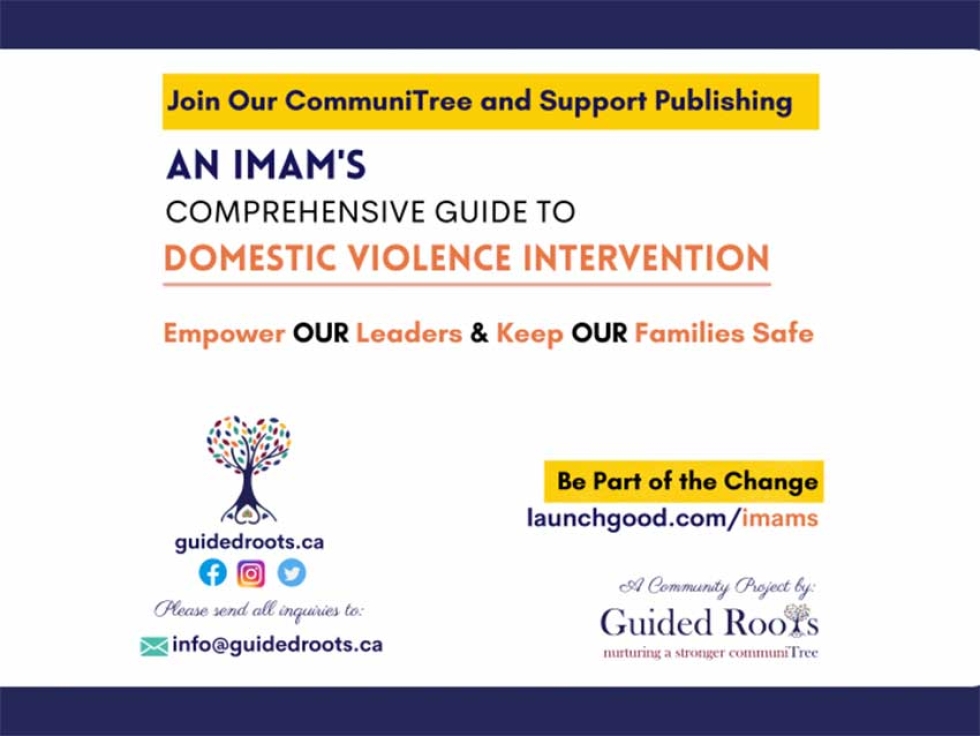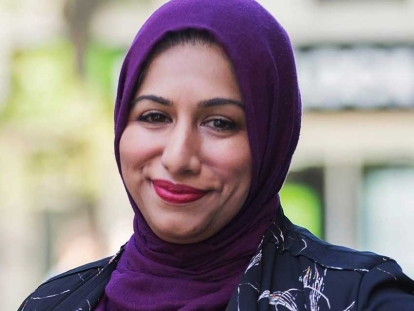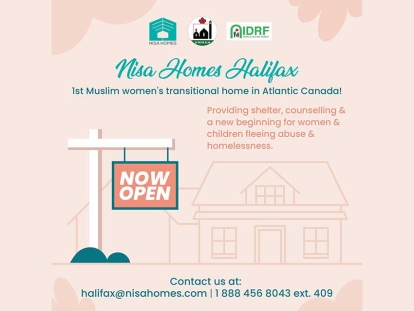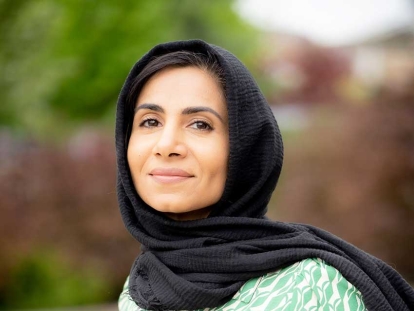
Nov
Supporting Imams in Addressing Domestic Violence in Muslim Communities: The Guided Roots Project
Written by Chelby DaigleNusrat Nowrin is the founder of Guided Roots, a Canadian Muslim organization that aims to support healthy Muslim families, with a current focus on addressing domestic violence.
Nusrat earned her Bachelor’s degree in Chemical and Bio-Engineering from the University of Toronto, with a certificate in Entrepreneurship & Business Innovation. She also studied Islamic sciences online with globally renowned scholars, earning a Master’s degree and an Advanced Diploma in Islamic Studies, and a certification in Quranic Arabic all from the International Open University (IOU). It was her dynamic involvement in her faith community during this period, that inspired her post-graduate research on domestic violence in the Canadian Muslim community. The findings opened her eyes to the depth of the problem, but more importantly, it presented a unique potential of the Muslim community to change the current narrative.
Muslim Link interviewed Nusrat about Guided Roots, her research, and the current project it is fundraising on LaunchGood.com: An Imam's Intervention Guide to Domestic Violence Intervention.
1. Tell us about the make up of the organization
Guided Roots is a community of Canadian Muslims who recognize the importance of proactively addressing domestic violence and mental health and creating a community-based support system to promote healthy families. As a growing volunteer-led organization at its infancy, we are fortunate to have within our board and among our advisors and volunteers, individuals from different scores of life - professionals, community builders, faith leaders, scholars, stay at home or single parents and survivors – who generously contribute their time and expertise to promote our mission. Our current team has representation from diverse ethnocultural backgrounds, including South Asian, Arab, African, East European and North American Muslims. We are primarily based in Ontario, but thanks to lockdown and normalization of remote work, our team members are not restricted by a location. We think of Guided Roots as a communiTree bonded by the power of faith, dedication, teamwork, and shared vision.
2. Could you tell us about the events in your community that sparked the idea for this project?
Four years ago, I came across the case of a sister who was crying in the sister’s section of the mosque after leaving the Imam’s office. Her husband was emotionally and sometimes even physically abusive. She wanted the Imam to talk to him. But our Imam didn’t know who to believe and how to help. Her husband was a board member at the mosque – a very pleasant and philanthropic figure in the community. She left the Masjid, feeling completely helpless.
As a newly married woman myself, I was just getting introduced to the world of 'wife tales'. I heard whispers here and there, and it was only when we started talking about domestic violence explicitly that people shared stories of ‘others they knew’. We went to our Imam and requested to address this issue in the Friday khuthba or at a men’s halaqa. The request was dismissed, quoting ‘we have already given a sermon on the rights of wives once this year’, ‘there is little we can do’, ‘domestic violence is not a big problem in our community’.
On the other hand, as a student of Islamic sciences, I was repeatedly asked by women, ‘what does Islam say about domestic violence?’, because religion was being mis-used by some to justify their abuse.
It was obvious that there was a gap in understanding the reality of the situation and the awareness within our faith leaders or their perceived role in it. We needed data and a full picture before we could even talk about this issue. That’s what led me to do my thesis on this topic, and the findings led us to this project.
3. What type of research have you organized as part of this project so far?
Between 2018 and 2019, I conducted an academic survey on domestic violence in the Canadian Muslim community, which was participated in by 170 ever-married Muslim women in Canada, and I conducted interviews of Muslim faith leaders. The research explored the prevalence of domestic violence, key-risk factors, religiosity factors, justification using Islam, and activism of the local Imams in the Canadian Muslim community. It also explored the Islamic perspective on domestic violence through a cross-examination of Quranic verses, Prophetic traditions, historical treatment, and linguistic analysis. The findings of the research can be accessed here.
4. How did you bring a team together of like-minded Muslims to work on this project?
Once the data analysis was complete, knowing the enormity of the domestic violence situation in our community and how much survivors sought after the Imam’s counsel, I had no other option but to do something, and soon. I started talking about it with my family and friends, and within a few months, we had a team of volunteers, all Canadians, Muslims, and each of them courageous and passionate about bringing about positive change in our community, contributing with their very different experiences and expertise. We held brainstorm sessions, and asked Imams in our community for their ideas and feedback. We worked on a holistic plan to address domestic violence in the Canadian Muslim community, both from the perspective of nurturing healthy families and mental health and preventing abuse. We are a young and growing community, and we welcome anyone who wants a platform to do his/her part in this mission.
5. Why do you feel there is a need for an Imam's Guide?
The project, An Imam's Comprehensive Guide to Domestic Violence Intervention, is based on the need for information, resources, and training about this stigmatized problem that is accessible and available to our faith leaders and community members. Muslim faith leaders have an enormous potential to help and support victims of domestic abuse and silence abusers, if they themselves are aware, informed, active, and have access to the right resources. We know this because this is what we learnt from our Muslim community in Canada through our research. Through our research we found the following:
- One in three Muslim women in Canada experiences domestic (spousal) violence (same as the Canadian national average).
- One in three abusers misquote religious texts to justify abuse. Most of them attend the Jummah (Friday prayer).
- The interviews of faith leaders conclude that most Muslim faith leaders in Canada believe in the religious intolerance of domestic abuse, yet khuthba (sermon) on domestic violence are rare.
- Half of all women who experienced spousal violence (50%) said that they went to their Imams for marital counsel. This means, two out of three women who approach their Imam for marital counsel might be a victim of domestic violence, though they seldom disclose it.
- Imams are often the first responders a victim comes to, and sometimes the only one
‘The Imām is a guardian and he is responsible (for his subjects)’ [Al-Bukhāri].
1400 years ago, the Prophet Muhammad (pbuh) implored men to end violence against women. He counseled against marrying abusive men [Muslim], intervened in cases of domestic violence [Abu-Dawud, Muwatta Malik], and regularly gave sermons about upholding the honour of one’s wife. Somewhere down the line, we have failed to follow his legacy.
We take from the Prophet’s (pbuh) example and believe that when Imams openly condemn domestic violence and educate community members of its impact on the next generation of Muslims, it may not only dismantle the fears that prevent victims from seeking help, but the Muslim community may also address this issue better than any others.
6. Have you connected with other Muslim initiatives locally, across Canada and in other countries in order to research how best to addresses these issues in your local community?
Absolutely. We have initiated conversation and collaboration with organizations both in Canada and US, to better understand and apply ‘what works’. Earlier this year, we conducted a series of conversations with Muslim and Non-Muslim service, advocacy and women’s organizations and shelters to better understand the needs of our community. We also spoke with researchers who have worked with the Muslim community for decades, the Ministry, and the Imams in our community. Domestic violence is a complex, deep-rooted societal issue, and to address it, multi-sectoral and community collaboration is absolutely essential.
7. What do you hope to achieve with your fundraiser?
We hope to make the content of An Imam's Comprehensive Guide to Domestic Violence Intervention free and accessible for our Imams and faith leaders in Canada. In this phase of the project, we are working to publish an e-book, and bite-sized information videos (which we hope to make publicly accessible to anyone with internet). We will only be able to keep the content free if we raise enough funds through our community fundraiser to cover all the expenses involved in reviewing, publishing and creating the creative content.
8. What are other ways that people can support your initiative?
Join our CommuniTree! As a volunteer-led community-based organization, our doors are always open for individuals who feel passionate about using their skills to influence positive societal change. For this particular project, skills and support in graphics, video editing, marketing and publication will be helpful. If you are an Imam, Chaplain, or a Muslim scholar, please consider joining our Religious Advisory Board. You can always support the project by promoting it within your network and becoming a ‘Root’ for your community. To find out about the different ways to get involved, please visit https://guidedroots.ca/join-our-team/ or email us at This email address is being protected from spambots. You need JavaScript enabled to view it.
9. Is there anything else you would like to add?
Survivors of domestic violence face many invisible barriers that prevent them from seeking the help that they need. Fear of being judged, isolated, shamed and blamed by others in the community, are a few to name. Domestic violence not only affects the survivors, but it permanently scars the children and eventually affects us all. We, each of us, can make a difference by creating a welcoming and less judgemental environment where the oppressed can speak without fear. Our words are powerful, let us remember that.
















